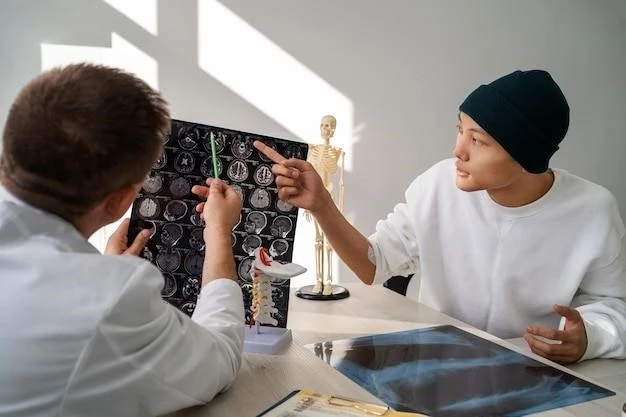Gonadal Dysgenesis XY Type Associated Anomalies
When it comes to understanding Gonadal Dysgenesis XY syndrome‚ it’s crucial to grasp the genetic underpinnings and how they manifest in reproductive abnormalities. Stay tuned for insights on the impact of this condition on overall health and future research directions.
Understanding Gonadal Dysgenesis XY Syndrome
Gonadal Dysgenesis XY Syndrome is a genetic condition where individuals with a Y chromosome have underdeveloped gonads‚ impacting their reproductive system. This results in infertility and other symptoms like delayed puberty. The sex chromosome karyotype in affected individuals is typically 46‚XY. The gonadal abnormalities in this syndrome are characterized by partial or complete absence of testicular tissue‚ leading to hormonal imbalances and impaired fertility.
Individuals with Gonadal Dysgenesis XY Syndrome may experience a range of physical and developmental challenges due to the genetic mutation affecting their gonads. It is important to understand the implications of this condition for overall health and well-being. Genetic counseling plays a key role in providing individuals and families with information about the syndrome‚ its inheritance patterns‚ and available management options.
By delving into the genetic aspects of Gonadal Dysgenesis XY Syndrome‚ healthcare providers can offer personalized care and support to affected individuals. Understanding the genetic basis of this syndrome is essential for early diagnosis‚ intervention‚ and monitoring of associated anomalies. Stay informed about the latest research and advancements in genetic testing to empower individuals with Gonadal Dysgenesis XY Syndrome.
Symptoms and Abnormalities

Gonadal Dysgenesis XY Syndrome presents with a variety of symptoms and abnormalities that can impact an individual’s health and quality of life. Common signs include delayed or absent puberty‚ underdeveloped gonads‚ and hormonal imbalances. As a result‚ individuals may experience infertility and issues related to sexual development.
Other abnormalities associated with Gonadal Dysgenesis XY Syndrome may involve physical characteristics such as short stature‚ webbed neck‚ and lymphedema. Additionally‚ individuals with this syndrome may be at higher risk for certain health conditions‚ including heart defects and kidney abnormalities.
It is important for healthcare providers to recognize these symptoms and abnormalities early on to provide appropriate care and support. Through regular monitoring and management of the condition‚ individuals with Gonadal Dysgenesis XY Syndrome can optimize their health outcomes and quality of life. Genetic testing and karyotype analysis play a crucial role in confirming the diagnosis and understanding the specific genetic mutations underlying the syndrome.
Diagnosis and Karyotype Analysis
Diagnosing Gonadal Dysgenesis XY Syndrome involves a comprehensive evaluation that includes genetic testing and karyotype analysis. Genetic testing helps identify specific mutations or anomalies in the sex chromosomes that are associated with the syndrome. Karyotype analysis‚ which examines the chromosomal composition of an individual‚ plays a crucial role in confirming the presence of XY gonadal dysgenesis.
Healthcare providers may also conduct hormone level assessments to detect hormonal imbalances and evaluate gonadal function. Imaging studies such as ultrasound or MRI may be used to visualize the gonads and assess their structure and development. A multidisciplinary approach involving endocrinologists‚ geneticists‚ and reproductive specialists is often necessary to accurately diagnose and manage Gonadal Dysgenesis XY Syndrome.
Early diagnosis through comprehensive genetic and karyotype analysis is key to initiating appropriate interventions and support for individuals with this syndrome. Understanding the specific genetic underpinnings of the condition can guide personalized treatment strategies and reproductive options. Stay informed about the latest advancements in genetic diagnostics to ensure accurate and timely diagnosis of Gonadal Dysgenesis XY Syndrome.
Turner Syndrome and Gonadal Dysgenesis XY
The relationship between Turner Syndrome and Gonadal Dysgenesis XY is complex and linked to chromosomal abnormalities. Turner Syndrome‚ characterized by the partial or complete absence of one X chromosome in females‚ can sometimes overlap with Gonadal Dysgenesis XY‚ where individuals with a Y chromosome exhibit gonadal abnormalities.
This interplay of sex chromosome anomalies can result in a spectrum of reproductive and developmental challenges. Understanding the genetic mechanisms underlying Turner Syndrome and Gonadal Dysgenesis XY is essential for accurate diagnosis and tailored management strategies. Individuals with these conditions may benefit from a multidisciplinary approach involving genetic counselors‚ endocrinologists‚ and reproductive specialists.
By exploring the connection between Turner Syndrome and Gonadal Dysgenesis XY‚ healthcare providers can better address the unique needs and complications that may arise. Stay informed about the latest research findings and diagnostic approaches to enhance the care and support provided to individuals affected by these syndromes.
Infertility and Reproductive Challenges
Individuals with Gonadal Dysgenesis XY Syndrome often face infertility and various reproductive challenges due to gonadal abnormalities. The underdeveloped or absent gonads in this condition can impact the production of sex hormones essential for fertility. Hormonal imbalances and insufficient germ cell development contribute to the difficulty in conceiving.
Reproductive options such as assisted reproductive technologies (ART) or egg/sperm donation may be considered for individuals with Gonadal Dysgenesis XY Syndrome who wish to have children. It is important for affected individuals to consult with reproductive specialists to explore available options and formulate a personalized reproductive plan.
Managing infertility and reproductive challenges associated with this syndrome requires a comprehensive approach that addresses both the physical and emotional aspects of fertility. By actively engaging with healthcare providers and fertility experts‚ individuals with Gonadal Dysgenesis XY Syndrome can navigate the complexities of infertility and make informed decisions regarding their reproductive health.
Management and Treatment Approaches
Effective management of Gonadal Dysgenesis XY Syndrome involves a multidisciplinary approach to address the diverse symptoms and reproductive challenges associated with the condition. Hormone replacement therapy (HRT) may be recommended to regulate hormone levels and support physical development in affected individuals.
Individualized treatment plans tailored to the specific needs of each person with Gonadal Dysgenesis XY Syndrome are essential for optimizing health outcomes. Regular monitoring of hormone levels and gonadal function is crucial to assess the effectiveness of treatment and make necessary adjustments.
Alongside medical interventions‚ psychological support and counseling play a key role in helping individuals cope with the emotional impact of the syndrome and navigate the complexities of infertility. By fostering a collaborative relationship with healthcare providers‚ individuals with Gonadal Dysgenesis XY Syndrome can access comprehensive care that addresses their holistic well-being.
Impact of Gonadal Dysgenesis XY on Overall Health
Gonadal Dysgenesis XY Syndrome can have a significant impact on the overall health and well-being of affected individuals. The hormonal imbalances and reproductive abnormalities associated with the syndrome may lead to physical challenges such as delayed puberty and fertility issues.
Beyond the reproductive system‚ Gonadal Dysgenesis XY can affect various aspects of health‚ including bone density‚ cardiovascular health‚ and emotional well-being. Managing the syndrome requires a comprehensive approach that addresses not only the physical symptoms but also the psychological and social implications;
Regular health assessments‚ including monitoring of hormone levels and bone health‚ are essential for individuals with Gonadal Dysgenesis XY Syndrome to proactively manage potential health risks. Collaborating with healthcare providers to develop a personalized care plan can help individuals navigate the challenges posed by the syndrome and maintain optimal health and quality of life.
Future Research and Genetic Counseling
Future research in the field of Gonadal Dysgenesis XY Syndrome is crucial for advancing our understanding of the genetic mechanisms underlying the condition and exploring potential treatments. Research efforts focused on unraveling the complexities of sex chromosome abnormalities can pave the way for more targeted therapies and interventions.
Genetic counseling plays a vital role in providing individuals and families affected by Gonadal Dysgenesis XY Syndrome with valuable information about the condition‚ its inheritance patterns‚ and available management options. Genetic counselors can offer support and guidance in decision-making regarding family planning‚ reproductive options‚ and understanding the genetic implications of the syndrome.
By participating in research studies and seeking genetic counseling services‚ individuals with Gonadal Dysgenesis XY Syndrome can contribute to the advancement of scientific knowledge and access specialized support tailored to their unique genetic profile. Stay informed about ongoing research initiatives and genetic counseling resources to empower individuals with the information needed to make informed decisions about their health.
Conclusion⁚ Empowering Individuals with Gonadal Dysgenesis XY
In conclusion‚ individuals with Gonadal Dysgenesis XY Syndrome face unique challenges related to reproductive health and overall well-being. By seeking early diagnosis through genetic testing and karyotype analysis‚ affected individuals can access tailored management strategies to address the symptoms and abnormalities associated with the syndrome.
It is essential for healthcare providers to adopt a multidisciplinary approach that encompasses medical interventions‚ psychological support‚ and genetic counseling to provide comprehensive care to individuals with Gonadal Dysgenesis XY Syndrome. Empowering affected individuals with knowledge about their condition‚ available treatments‚ and reproductive options can help them make informed decisions about their health and well-being.
Through ongoing research efforts and genetic counseling services‚ individuals with Gonadal Dysgenesis XY Syndrome can actively participate in shaping the future of healthcare for this condition. By fostering a supportive and collaborative healthcare environment‚ we can empower individuals with Gonadal Dysgenesis XY Syndrome to lead fulfilling lives and navigate the challenges posed by this genetic anomaly.
